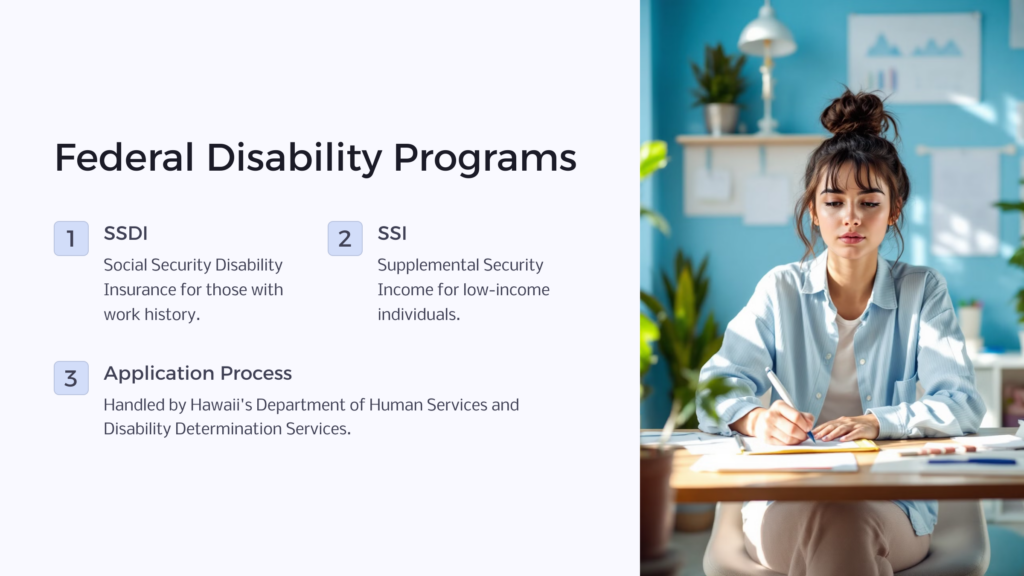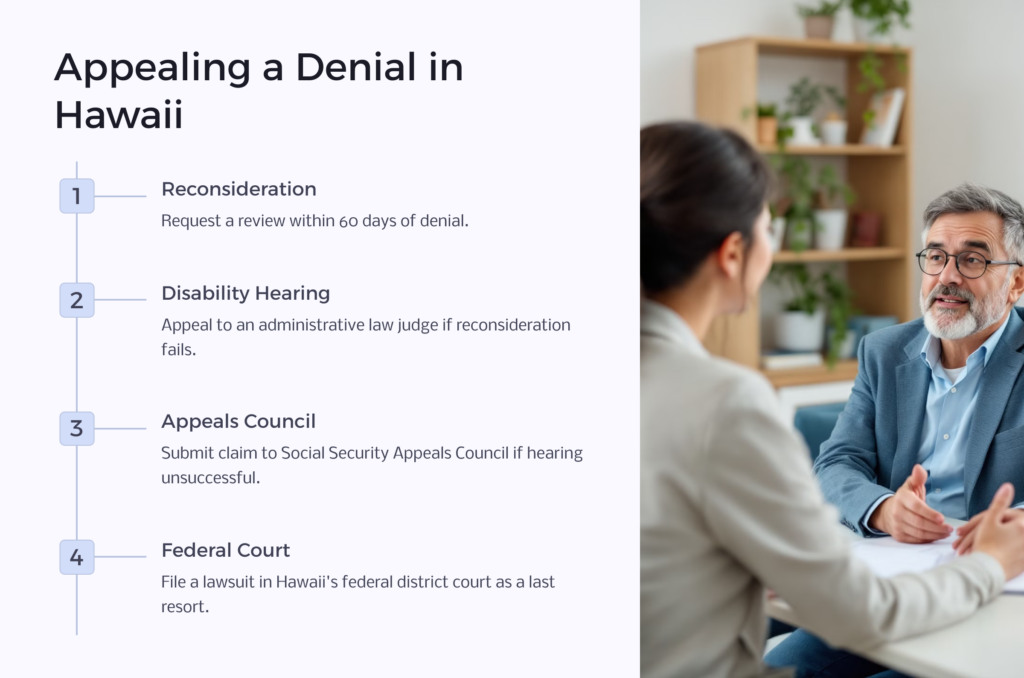Hawaii has both local and federal programs intended to help its residents with disabilities obtain financial and other related services. At the federal level, Hawaii residents have access to Social Security Disability Insurance (SSDI) and Supplemental Security Income (SSI).

Applications for these go through Hawaii’s Department of Human Services and are approved or rejected by the Disability Determination Services (DDS).
Hawaii also has local programs like TDI (Temporary Disability Insurance), the Division of Vocational Rehabilitation (DVR), Medicaid, and unemployment assistance. Disabled veterans should also seek aid through Hawaii’s Office of Veteran’s Services.
Facts About Hawaii
About 22% of Hawaiians have some type of disability, but only a small percentage of those receive Social Security benefits from the federal government. Hawaiians with disabilities are much more likely to be obese, smoke, and have conditions like diabetes and heart disease. Assistance is available through state and federal agencies.
Hawaii is unique among U.S. states in regards to employee health insurance due to its 1974 law, the Hawaii Prepaid Health Care Act (PHCA) which requires all employers to provide health plans for employees on payroll for more than 20 hours a week. This is the only law of its kind and makes Hawaii exempt from the national Employee Retirement Income Security Act (ERISA) that sets standards for employer-provided health benefits.
How To Qualify for SSDI in Hawaii
Your SSDI application will be processed and determined by Hawaii’s Disability Determination Branch (DDB). SSDI is intended to help those with disabilities severe enough to impact their ability to work for at least 12 months. Since so few applications are accepted in the first round, you should take the time to review all requirements before submitting your disability claim.
To be considered for coverage, applicants must show the following:
- Sufficient work history and that you have paid into the Social Security tax system
- Your condition must be on the Blue Book created by the SSA. This guide contains all conditions considered “severe” enough to limit one’s ability to work. This list covers conditions such as intellectual, physical, or developmental disabilities.
- If you currently have a job, you must be earning under a certain amount to qualify
Note that if you are working in some capacity, state and federal law protects you against disability discrimination by your employer. As an employee, you are entitled to any “reasonable accommodation” that allows you to complete your work.
How to Apply for SSDI in Hawaii

There are three ways to apply for Social Security Disability: online, over the phone, or in person. Your application must be made with the Social Security Administration (SSA).
No matter which method you choose to apply with, you’ll need to have documentation prepared ahead of time. The type of documentation to receive Social Security disability benefits will vary by applicant, though most people will be asked to provide the following documentation:
- Personal information: Compile names, ages, and dates of birth for you, your spouse, and any minor children
- Marriage and divorce records if applicable
- Military records if applicable
- Name and contact information of your employer
- Direct deposit information
- Contact information of references who can answer questions about your disability (doctors, friends, family)
- Medical records pertaining to your disability
- Work and education history
Most people choose to apply online for SSDI benefits at SSA.gov. You can also call and apply over the phone with the federal Social Security office directly at 800-772-1213.
If you prefer to apply in person, you can call one of Hawaii’s five Social Security field offices to make an appointment. Offices are located in Wailuku, Kapolei, Honolulu, Hilo, and Lihue.
How To Appeal a Denial in Hawaii

It’s common for many first-time SSDI applications to be denied. Reasons for a denial can include lack of evidence, an incomplete application, or your condition may not be considered severe enough. If you don’t succeed the first time, you should start the appeals process immediately. Your first appeal must be made within 60 days of your denial.
Reconsideration – The first option for an appeal is reconsideration. A new representative will review your application to see if a different determination should be made. Approximately 20% of these cases are approved after this step.
Disability Hearing – If your reconsideration request was denied, you have 60 days to request a hearing with an administrative law judge. For this disability adjudication, you must bring additional documentation to support your claim. This can be in the form of medical records or simply a letter from your doctor, employer, or other individual who can attest to your disability.
There is one Hearing and Appeals Office in Hawaii. Located in Honolulu, the office can be reached at (855) 601-2479. At this stage, many claimants choose to employ an attorney for legal advice. Unfortunately, these hearings can sometimes take up to a year to schedule.
Appeals Council – Your next step is to appeal to the Social Security Appeals Council. Submit your claim online within 60 days.
Federal Court – Your last step in this process is to file a lawsuit with the district federal court in Hawaii, also located in Honolulu. At this point, you must retain the services of a disability lawyer, if you haven’t already.
More Hawaii Benefits
SSI
Supplemental Security Income (SSI) is a federal insurance program that provides aid to eligible low-income Americans. It is available to any Hawaii resident, but recipients must have a low income and be disabled, blind, or over the age of 65.
If you qualify for SSI benefits, you will usually be awarded Medicaid benefits as well. You may have to apply separately at your local health and human service office.
Hawaii Medicaid
Hawaii Medicaid is a medical care program run jointly by the federal and state government. Hawaii has two Medicaid programs, Med-QUEST and Medicaid Fee-for-Service. These programs provide medical insurance benefits to those making under a certain income limit and are not limited to only those with disabilities.
Those who are pregnant, blind, caring for a minor child, 65 and older, or are caring for someone with a disability can also qualify. These programs provide routine medical care as well as care for those with special needs such as those with developmental disabilities who may need adult daycare services. Since Hawaii has a high cost of living, the state sets income limits for eligibility.
TDI
The Hawaii Temporary Disability Insurance (TDI) is a wage replacement insurance coverage program. TDI benefits are intended for those who have a temporary, non-work related injury or illness, including pregnancy, who need to take time off work.
Eligible employees who qualify for these disability benefits for lost wages will receive 58% of their average weekly wage for up to 26 weeks with a maximum weekly payout of $640. TDI law requires that all claims be made within 90 days from the date of the disability or injury.
Most employers in Hawaii are required to carry TDI coverage. Some may pay the entire cost, but employers are allowed to share the cost with employees as long as it is less than 0.5% of the employees’ weekly wages.
Hawaii Unemployment
The Hawaii Department of Labor and Industrial Relations oversees Hawaii Unemployment benefits. The program provides temporary financial help to eligible Hawaii workers as they seek new employment. The program is available to any worker who has lost their job through no fault of their own, has worked in Hawaii during the past 12 months, and is actively looking for new work.
Hawaii Aging and Disability Resource Center (ADRC)
The ADRC is a disability resource center that connects people with disabilities, seniors, and caregivers with resources available throughout the state, including access to a disability attorney. This help is free to anyone in the state.
Hawaii Social Security Offices
| SSA Field Office Locations in Hawaii | ||
| Wailuku SSA Office | 2200 Main Street Suite 125 Wailuku, HI 96793 | (855) 572-4863 |
| Kapolei SSA Office | 970 Manawai Street Kapolei, HI 96707 | (855) 572-4866 |
| Honolulu SSA Office | 300 Ala Moana Blvd Rm 1-114 Fed Bldg Honolulu, HI 96850 | (855) 572-4879 |
| Hilo SSA Office | 111 E Puainako St Suite 710 Hilo, HI 96720 | (855) 572-4860 |
| Lihue SSA Office | 4334 Rice Street Suite 105 Lihue, HI 96766 | (855) 572-4842 |
Hawaii Hearing and Appeal Offices
Hawaii is in Region 9 (San Francisco), which services Arizona, California, Hawaii, and Nevada.
The Honolulu Hearing Office services the cities of Hilo, Honolulu, Kapolei, Lihue (Kauai), and Wailuku (Maui).
| Region 9 – SSA Office of Hearing Operations in Hawaii | ||
| SSA Hearing Office – Honolulu | 300 Ala Moana Blvd, Rm 3-303 Prince Kuhio Federal Building Honolulu, HI 96850 | (855) 601-2479 |
 Benefits.com Advisors
Benefits.com Advisors
With expertise spanning local, state, and federal benefit programs, our team is dedicated to guiding individuals towards the perfect program tailored to their unique circumstances.
Rise to the top with Peak Benefits!
Join our Peak Benefits Newsletter for the latest news, resources, and offers on all things government benefits.




















